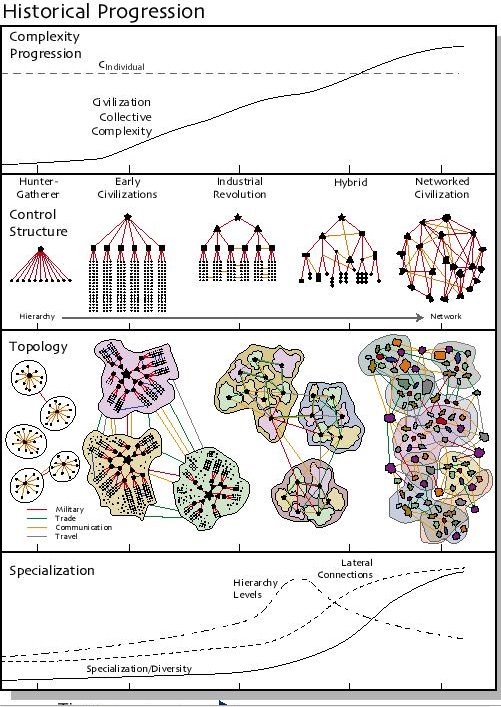COMPLEXITY AND CONNECTIVITY:BAR-YAM AGAIN

Preface:
I’ve been pondering the relationship between complexity and connectivity ever since I was prompted by a post and an email from Dave at Thoughts Illustrated. Due to time constraints, I was not able to give the insights Dave offered in his email the proper attention they deserved then but I’m returning to the subject today.
The background here is a short paper on civilizational complexity, ” Complexity Rising:From Human Beings to Human Civilization, A Complexity Profile” by Dr. Yaneer Bar-Yam that I forwarded to a number of thoughtful people, some of whom also were bloggers. My take on Bar-Yam’s paper at the time had to do with ” The Resilience of Civilizations“; Steve DeAngelis at ERMB responded with “Networked Civilization Revisited“; Curtis Gale Weeks at Phatic Communion put these ideas in the context of the theories of John Boyd with “Rule Sets and the Revised OODA” and Dan of tdaxp followed Curtis with “Comments on Verticalization and Progress“. Dr. Von, who introduced me to the ideas of Dr. Bar-Yam in the first place, offered some verbal commentary in person but helpfully pointed to an older post of his, “Our Universe:Continual Emergence“as well.
The Relationship of Complexity and Connectivity in Civilization:
Civilizations are long enduring, complex adaptive social systems that remain distinctive from their neighbors. Differences between civilizatons are visible even to casual observers in the form of culture, language, religious belief, social customs and economic productivity. The origin or causation of civilizational differences have been hotly debated for dozens of centuries and at various times, climate, geography, divine favor, chance or superiority in terms of culture, genetics, martial prowess, political, economic or moral systems have all been offered up as explanations and all have met with fierce criticism.
However, my purpose here is not to weigh in on the merits of Baron de Montesquieu, Jared Diamond, Karl Marx, Victor Davis Hanson or Robert Wright but to point out, first, that the superficial manifestations of civilizations, that make them unlike others, all represent underlying patterns of complexity and of connectivity. Secondly, that while complexity and connectivity in a “superorganism” sized social system have a high degree of interaction and are often mutually reinforcing, they are not one and the same. On some levels, complexity can increase or sharply limit connectivity. Connectivity in turn, may simplify or complicate the workings of a system, increasing or decreasing ” friction” as well as numerous other effects.
Take for example, late medieval to early modern central Europe. The Holy Roman Empire, at one point, had something on the order of 300 independent, overlapping, interdependent polities. That’s more sovereigns than exist today on the entire planet, some ruling nothing bigger than a knightly estate, crammed into an area slightly larger than Germany.

Obviously, in the case of the Holy Roman Empire, the degree of political and social complexity were very high relative to the population of the time or to monarchical states like England . This complexity came at the expense of connectivity, particularly economic connectivity given the number of sovereign and semi-sovereign entities ( most with their hand out) that could and did interfere with trade in a myriad of irrational ways. Unsurprisingly, even after Napoleon consolidated this Germanic crazyquilt into a more manageable 35 state Confederation of the Rhine, the first serious exploration of German unification involved a proposal for a customs union, the Zollervein, that would have simplified, and rationalized trade, increasing the level of connectivity.
Dr. Barnett has made a similar argument regarding the connectivity effect of the Federal union of the United States in Blueprint for Action as well as elsewhere. If you look at the lowest panel of the Bar-Yam Historical Complexity diagram above, you will note the “hierarchy” line levelling off and falling while the “specialization/diversity” and “lateral connection” lines rising in parallel along a timeline. This is a nice visualization of changing the political or legal complexity of rule-sets ( reducing the number of competing rule-sets) intersecting with improvements in technology to permit higher levels of emergent connectivity.
Granted, the higher levels (and faster velocity of transaction) of connectivity are also, in themselves a form of complexity that will generate unanticipated spillover effects that will give rise to demands for regulation or control in the form of new rule-sets. As will the resistance of vested interests to emerging forms of connectivity or technology that endanger rentier arrangements, oligopolistic markets or the authority of corrupt tyrannies. As the relationship between complexity and connectivity is dynamic, these reactionary political responses to creative destruction are unavoidable.
Their success though, is far from inevitable. We have choices if we care to exercise them.




